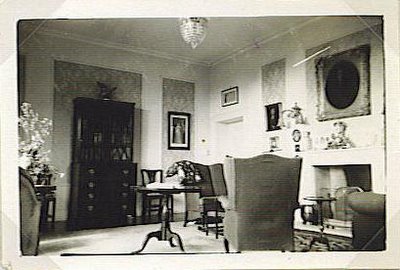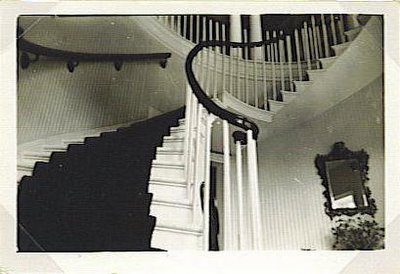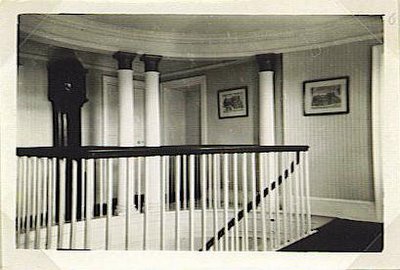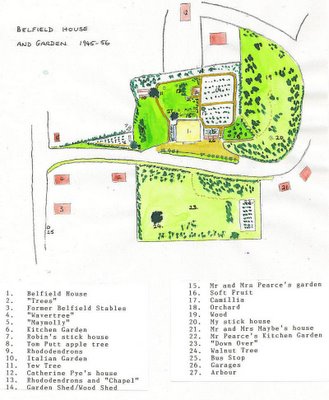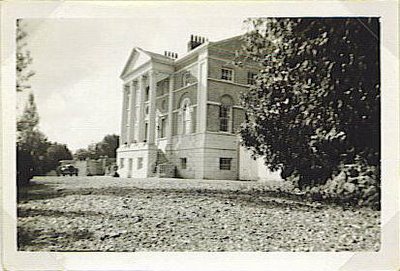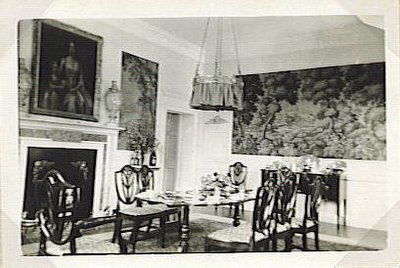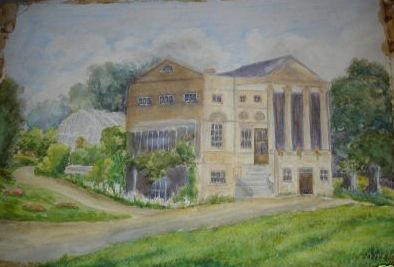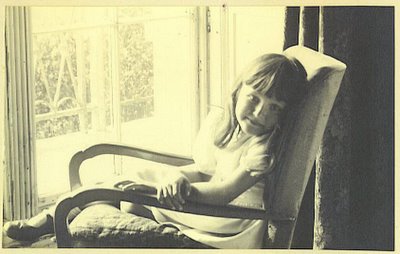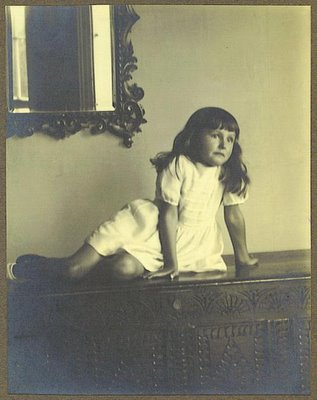VISITORS TO BELFIELD. (1)
The visit during one summer holiday of friends of my parents from Oxford days, John and Mary B---, together with their daughters Elizabeth and Catherine, led to my first visit to Portland, and was by train.
John B--- had been an Oxford Don who married Mary P------, a great friend of my mother. They had both been undergraduates at Lady Margaret Hall at the same time. Elizabeth and Catherine were both older than me. Elizabeth was about to go up to Oxford herself, where she had obtained a place at St Annes, and Katherine was still at school.
This visit must have taken place in the 1950's, as I was about to start learning Latin the next term at Queen's Gate. My father thought it would be fun to teach me a Latin sentence which I could recite to John B--- on his arrival, using beginners' vocabulary from the first Latin Primer. The English translation was: "The sailor is kissing the pretty girl under the table", the Latin of which I have long since forgotten - but at the time it brought the desired response of great amusement, and set the tone for a relaxed and enjoyable visit.
Further amusements in the shape of excursions were laid on for the B--- family too, and these excursions were both exciting and memorable events in the days before we owned a car. Meticulous planning must have taken place beforehand for our visits to different parts of Dorset by publio transport, and although I have forgotten the order of these visits, one of them was our outing to Portland on the train.
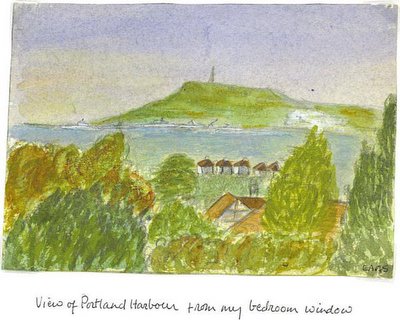
We probably went into Weymouth on the bus, in order to catch the train; or maybe we started from Radipole Station. I do not remember, but I do remember well the scenic route.
After passing Sandsfoot Castle, the railway crossed the Fleet at Ferry Bridge and continued along the harbour, parallel with the road and Chesil Beach, until it reached Chiswell, the first station on Portland. After this the line turned east, again hugging the harbour shore, before dramatically starting its climb up the side of East Weare Cliff, past the station for what had been the Convict Prison, but was by then a Borstal Institution, and finally ending at Euston Station.
Even on a warm summer's day, Portland is a bleak, rocky and wind-swept place. Since the 17th century its main industry has been the quarrying of its famous stone, and later the building of the breakwater in the 19th century created one of the largest and safest naval harbours in the world until its recent closure.
Convict labour was largely used in the building of the breakwater, and this brought about the building of the Verne Prison. Few prisoners ever made successful escapes from Portland as the only way off the island by land was across Ferry Bridge, where immediate road blocks were set up the moment a prisoner went missing.
The island used to be famous for its own breed of hardy sheep, and in recent years sheep farming with this breed been re-established in a small way.
From Easton Station we would have walked the short distance to Wakenham, past some of the few remaining traditional local stone cottages with their stone-slated roofs and porches with the entrances set at right angles to the inner door so as to give protection from the cold Portalnd winds. One of these cottages, called Avice Cottage, was and still is a museum of local history which I am sure we must have visited before taking the path next to it down to Church Ope Cove, passing the ancient Rufus Castle on our way.
Near the top of the path we would have seen a large house called Pennsylvania Castle, surrounded by some of the only trees on Portland, with its spectacular view down to the Cove past the ruins of St Andrew's Church.
The house is not really a castle, but was built around 1797 by John Penn: the son of William Penn, founder of the state of Pennsylvania USA. William's wife was one of Queen Charlotte's ladies in waiting, and John was frequently in the Royal party on its visits to Weymouth.
It was during an excursion to Portland with the King that John first saw the site which he purchased from the Crown, employed James Wyatt as his architect and proceeded to build the house. It took three years to build, and was finally opened by one of George III's daughters in 1800. Three years later, John Penn founded the Portland Royal Legion to defend the island against a possible invasion by Napoleon in 1804.
Not long after our visit the house came up for sale and my parents were interested in possibly buying it, but after going round it one afternoon they quickly realised that it would be totally impracticable. It needed a lot of money spending on it, and shortly afterwards it was sold for ₤10,000 - half of what it had cost to build in 1800 - and was turned into an hotel.
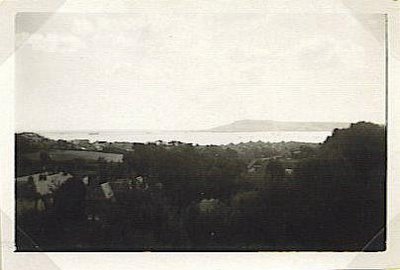
On this, our first visit, we continued our exploration of the island with the B--- family. I expect we brought a picnic lunch with us, which probably included a bottle of ginger beer or fizzy lemonade for me, and a flagon of cider for everyone else. I do remember us all sitting on the grass verge outside a pub in Wakenham Street, while John B--- went into the pub, perhaps for a beer and to check the latest cricket score.
I do not think we went to Portland Bill on that occasion as it would have been a bit too far to walk - although we might have taken a bus - but I do remember that we went to see the 18th century St George's Church at Reforne before we left.
St George's was in a poor state of repair, having been disused since 1917. Inside was all dust, cobwebs and flaking plaster. Half way down the aisle were two pulpits, and there was an organ loft at the west end into which we climbed.
Elizabeth B---, who was inclined to be what my mother called "highly strung", was quite overwhelmed by the melancholic atmosphere, while her more prosaic sister attempted to play the organ. Elizabeth imagined herself to be intensely "in love" with the long dead notables. Around that time it was with the 18th century artist Richard Wilson; after him came John Stanley, the 18th century blind organist at the Temple Church.
A few years later, she became engaged to be married to another blind organist, a Frenchman, but his parents objected so strongly to the match that the engagement was broken off.
<< Previous post · First post · Next post >>
John B--- had been an Oxford Don who married Mary P------, a great friend of my mother. They had both been undergraduates at Lady Margaret Hall at the same time. Elizabeth and Catherine were both older than me. Elizabeth was about to go up to Oxford herself, where she had obtained a place at St Annes, and Katherine was still at school.
This visit must have taken place in the 1950's, as I was about to start learning Latin the next term at Queen's Gate. My father thought it would be fun to teach me a Latin sentence which I could recite to John B--- on his arrival, using beginners' vocabulary from the first Latin Primer. The English translation was: "The sailor is kissing the pretty girl under the table", the Latin of which I have long since forgotten - but at the time it brought the desired response of great amusement, and set the tone for a relaxed and enjoyable visit.
Further amusements in the shape of excursions were laid on for the B--- family too, and these excursions were both exciting and memorable events in the days before we owned a car. Meticulous planning must have taken place beforehand for our visits to different parts of Dorset by publio transport, and although I have forgotten the order of these visits, one of them was our outing to Portland on the train.

We probably went into Weymouth on the bus, in order to catch the train; or maybe we started from Radipole Station. I do not remember, but I do remember well the scenic route.
After passing Sandsfoot Castle, the railway crossed the Fleet at Ferry Bridge and continued along the harbour, parallel with the road and Chesil Beach, until it reached Chiswell, the first station on Portland. After this the line turned east, again hugging the harbour shore, before dramatically starting its climb up the side of East Weare Cliff, past the station for what had been the Convict Prison, but was by then a Borstal Institution, and finally ending at Euston Station.
Even on a warm summer's day, Portland is a bleak, rocky and wind-swept place. Since the 17th century its main industry has been the quarrying of its famous stone, and later the building of the breakwater in the 19th century created one of the largest and safest naval harbours in the world until its recent closure.
Convict labour was largely used in the building of the breakwater, and this brought about the building of the Verne Prison. Few prisoners ever made successful escapes from Portland as the only way off the island by land was across Ferry Bridge, where immediate road blocks were set up the moment a prisoner went missing.
The island used to be famous for its own breed of hardy sheep, and in recent years sheep farming with this breed been re-established in a small way.
From Easton Station we would have walked the short distance to Wakenham, past some of the few remaining traditional local stone cottages with their stone-slated roofs and porches with the entrances set at right angles to the inner door so as to give protection from the cold Portalnd winds. One of these cottages, called Avice Cottage, was and still is a museum of local history which I am sure we must have visited before taking the path next to it down to Church Ope Cove, passing the ancient Rufus Castle on our way.
Near the top of the path we would have seen a large house called Pennsylvania Castle, surrounded by some of the only trees on Portland, with its spectacular view down to the Cove past the ruins of St Andrew's Church.
The house is not really a castle, but was built around 1797 by John Penn: the son of William Penn, founder of the state of Pennsylvania USA. William's wife was one of Queen Charlotte's ladies in waiting, and John was frequently in the Royal party on its visits to Weymouth.
It was during an excursion to Portland with the King that John first saw the site which he purchased from the Crown, employed James Wyatt as his architect and proceeded to build the house. It took three years to build, and was finally opened by one of George III's daughters in 1800. Three years later, John Penn founded the Portland Royal Legion to defend the island against a possible invasion by Napoleon in 1804.
Not long after our visit the house came up for sale and my parents were interested in possibly buying it, but after going round it one afternoon they quickly realised that it would be totally impracticable. It needed a lot of money spending on it, and shortly afterwards it was sold for ₤10,000 - half of what it had cost to build in 1800 - and was turned into an hotel.

On this, our first visit, we continued our exploration of the island with the B--- family. I expect we brought a picnic lunch with us, which probably included a bottle of ginger beer or fizzy lemonade for me, and a flagon of cider for everyone else. I do remember us all sitting on the grass verge outside a pub in Wakenham Street, while John B--- went into the pub, perhaps for a beer and to check the latest cricket score.
I do not think we went to Portland Bill on that occasion as it would have been a bit too far to walk - although we might have taken a bus - but I do remember that we went to see the 18th century St George's Church at Reforne before we left.
St George's was in a poor state of repair, having been disused since 1917. Inside was all dust, cobwebs and flaking plaster. Half way down the aisle were two pulpits, and there was an organ loft at the west end into which we climbed.
Elizabeth B---, who was inclined to be what my mother called "highly strung", was quite overwhelmed by the melancholic atmosphere, while her more prosaic sister attempted to play the organ. Elizabeth imagined herself to be intensely "in love" with the long dead notables. Around that time it was with the 18th century artist Richard Wilson; after him came John Stanley, the 18th century blind organist at the Temple Church.
A few years later, she became engaged to be married to another blind organist, a Frenchman, but his parents objected so strongly to the match that the engagement was broken off.
<< Previous post · First post · Next post >>


